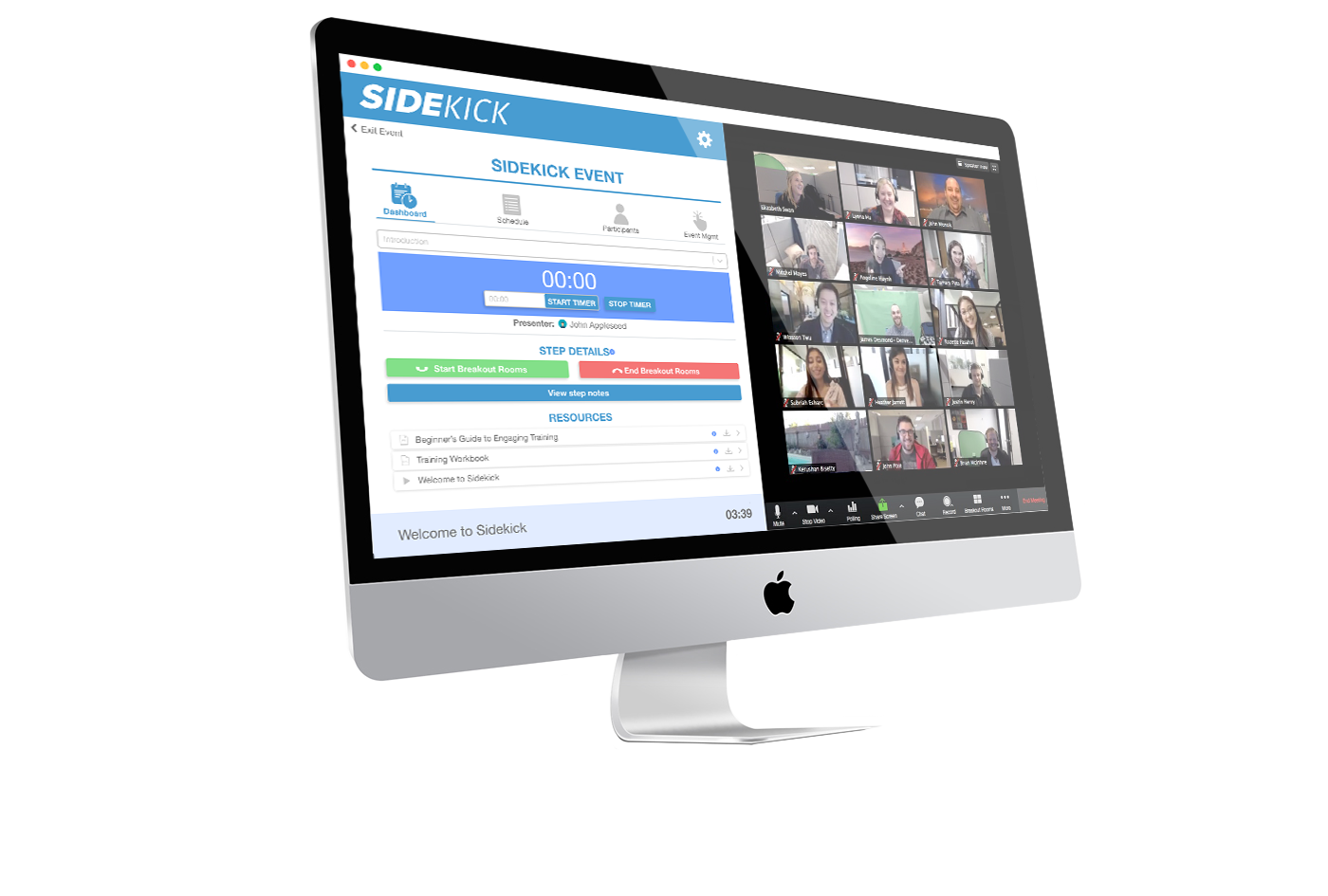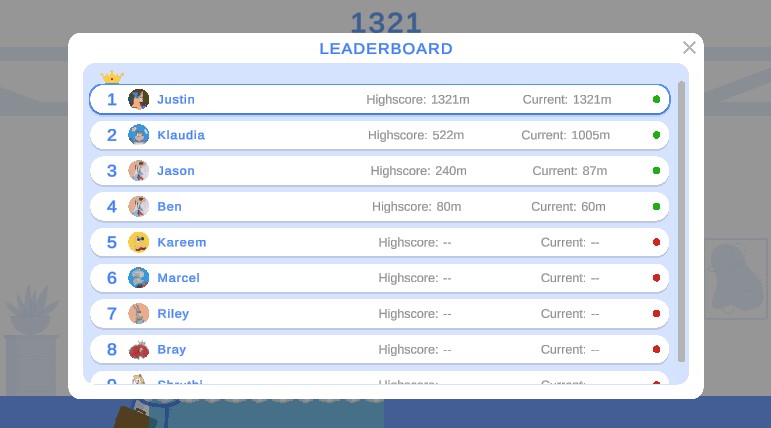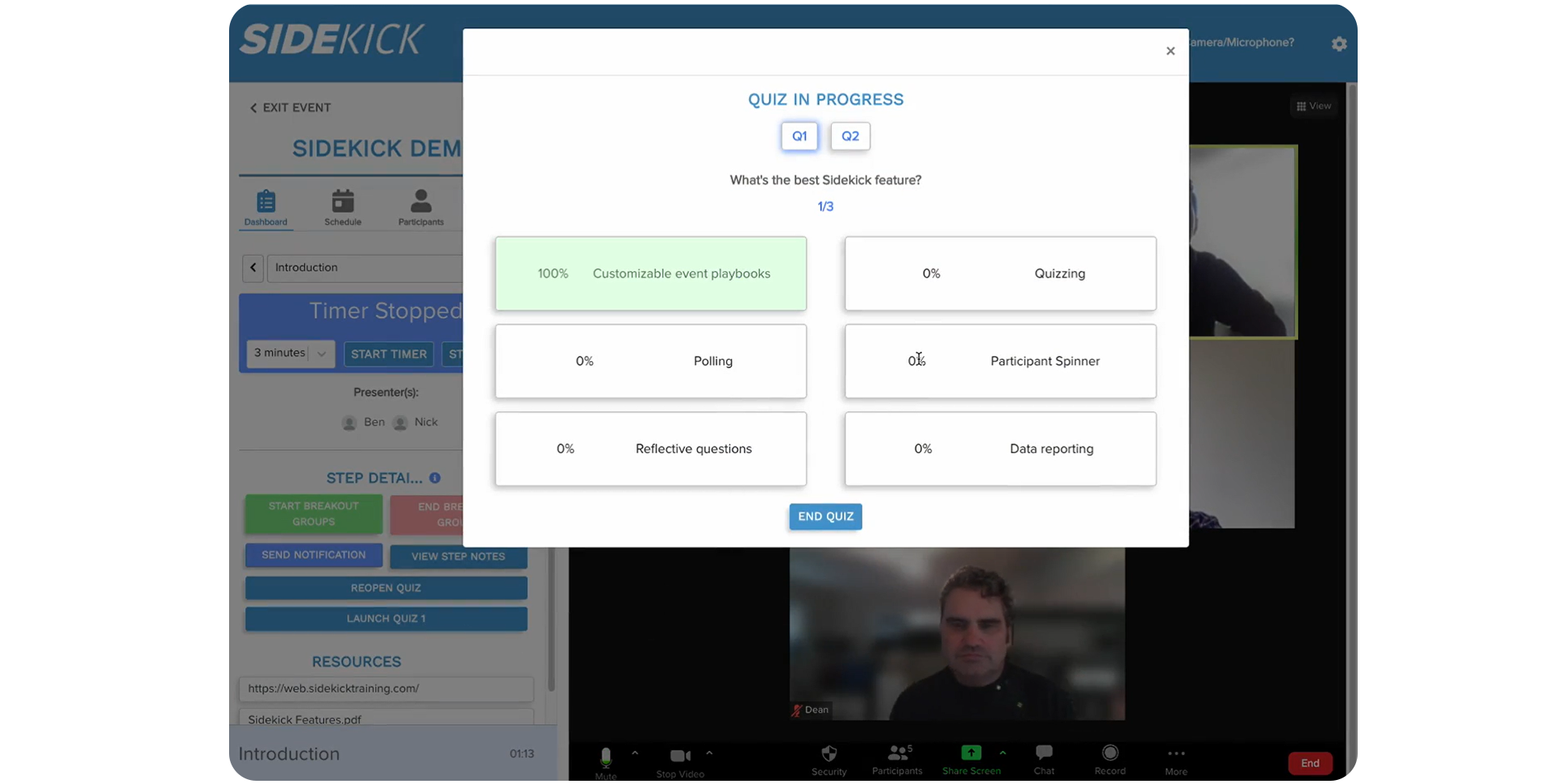July 31, 2023
Hybrid and remote work is here to stay - 63% of high-growth companies are making the shift to a hybrid model and 87% of employees take advantage of working remotely when given the opportunity. Flexibility in where and how work gets done is no longer the exception but increasingly the rule. Having a choice about work environment and location brings new challenges to overcome and opportunities to enhance performance and skill development.
As some team members work remotely and some in the office, a sense of common purpose, connection, and alignment is more important than ever for the success of organizations. Hybrid live learning is a critical tool for building and sustaining these connections when teams are distributed. These five pro tips from the Sidekick team will help you get the most out of your hybrid learning investment.
Tip 1: Align Learning with Purpose
Use hybrid live learning events to connect team members to your company’s purpose, mission, and values. Real-time, face-to-face conversations and connections can be powerful ways to help employees feel and embody the “why” of your company or organization.
The energy team members communicate in hybrid live learning sessions adds a dynamic that is often absent when they’re clicking through an eLearning module. The feeling of being seen and heard can help employees see themselves as part of a culture that cares about their success and is invested in their work.
To align with purpose, connect new learning, problem-solving, and skill development work to the company mission, vision, and values and what they mean for employees, customers, and the communities in which you live and work.
Tip 2: Focus on Multi-Perspective Problems
Consider the type of problem you’re attempting to solve. If the problem involves empathetically taking multiple perspectives, a changing, nuanced context, or building team buy-in, hybrid live learning is your friend. Sales and leadership training often involves problems where attending to the human dimensions of life and work is incredibly important. This doesn’t easily translate into an eLearning module.
If you’re simply transferring facts, a video or eLearning module might be just the right solution for the challenge you are facing. No one needs a scheduled session to listen to someone read a manual - but working through case studies, complex business problems, simulations, and scenarios where knowledge is applied by team members is a great use of hybrid live learning time to develop soft skills.
Tip 3: Motivate Intrinsically
The science of motivation tells us that intrinsic motivators - those linked to a sense of connection, purpose, and significance - are the most enduring, persistent, and powerful sustainers of human action. Hybrid live learning can connect us to these motivators and one another - in ways that self-paced learning cannot.
Hybrid live-learning discussions that require participants to take on multiple perspectives to analyze and discuss a problem, help build empathy and connection, and bridge differences to achieve team success. By providing team members opportunities to learn and problem-solve together in real time, companies can tap into intrinsic motivation, boost efficiency, and foster a learning culture.
Gamification is one way to amplify the power of intrinsic motivators - when play, collaboration, and friendly competition are paired with learning, not only are learners often more engaged, they are more likely to learn key knowledge and skills.

Tip 4: Novices and Experts are Different
Whether it’s a new hire or a senior employee taking on a new role, it’s important to remember that experts and novices on a topic learn differently. Learning pathways should be adapted to what your team knows. For novices, cognitive science tells us that breaking big problems and ideas into bite-sized challenges is critical.
New knowledge and skills must get through working memory to become part of long-term memory. Research tells us that most people can only process two to four new ideas in working memory at a time. If your learning event introduces more than three or four new concepts to novices without opportunities to practice, apply, and reflect on this new learning, it is less likely to stick.
Things are different for experts in a subject. For experts, tackling complex challenges is more efficient than being spoon-fed knowledge because they already have the concepts and schema to keep complex challenges from overwhelming their working memory.
To harmonize these unique needs, challenge your subject matter experts to become great live teachers. By tasking experts with breaking complex ideas down for novices, guiding their application, and modeling promising practices, they deepen their understanding of the subject matter while becoming better communicators of that expertise.
Tip 5: Leverage Dynamic Assessment and Feedback
Feedback on learning is most effective when it is specific, consistent, timely, relevant, and from a trusted source. Help novices learn from experts and get real-time feedback in context. Provide the space to clarify nuances and subtleties that are not well captured by standardized assessments. When the use of a skill is not right or wrong but more or less appropriate, depending on the circumstances, this sort of feedback helps cultivate the science and art of achieving organizational success into the flow of work.
Whether it is in handling an objection in a sales call, designing a product solution, or developing leadership skills, the work we do with and for other humans requires attention to balancing competing considerations and context. Dialogue and feedback from experienced colleagues who have encountered similar cases allow novices to develop practical artistry in the work that they do while tailoring insights to their unique strengths. To ensure all voices are heard, feedback and discussion protocols that work from strengths and expand to tackle challenges help guide this process.

Amplify Hybrid Live Learning with Sidekick
Want to learn more about how to boost your team’s performance through hybrid live learning? Book a call with the Sidekick team today.
Reference List
- Abramson, Ashley. “Cultivating Empathy.” Monitor on Psychology. American Psychological Association, November 1, 2021. https://www.apa.org/monitor/2021/11/feature-cultivating-empathy
- Cowan, Nelson. “The Magical Mystery Four: How Is Working Memory Capacity Limited, and Why?” Current directions in psychological science. U.S. National Library of Medicine, February 1, 2010. https://doi.org/10.1177/0963721409359277
- Fiorella, Logan, and Richard E Mayer. “The Relative Benefits of Learning by Teaching and Teaching Expectancy.” Contemporary Educational Psychology. Academic Press, June 7, 2013. 281-288 https://www.sciencedirect.com/science/article/abs/pii/S0361476X1300020.
- Indeed Editorial Team. “How to Improve Your Soft Skills in the Workplace”| Indeed.com. https://www.indeed.com/career-advice/career-development/how-to-improve-soft-skills
- Kalyuga, Slava, Paul Ayres, Paul Chandler, and John Sweller. “The Expertise Reversal Effect” Educational Psychologist, June 8, 2010, 23-31 https://doi.org/10.1207/S15326985EP3801_4
- Kirschner, Paul A, John Sweller, and Richard E. Clark. “Why Minimal Guidance during Instruction Does Not Work: An Analysis of the Failure of Constructivist, Discovery, Problem-Based, Experiential, and Inquiry-Based Teaching.” Educational Psychologist, June 8, 2010, 75-86 https://doi.org/10.1207/s15326985ep4102_1
- McDonald, Joseph. “Tuning Protocol.” Edited by David Allen. Schoolreforminitiative.org. Accessed September 22, 2022. https://schoolreforminitiative.org/doc/tuning.pdf.
- Nonaka, Ikujiro, and Ryoko Toyama. “Strategic Management as Distributed Practical Wisdom (Phronesis) .” Academic.oup.com. Industrial and Corporate Change, June 2007. 371-394 https://academic.oup.com/icc/article-abstract/16/3/371/653639?redirectedFrom=fulltext.
- Sachdeva, Ajit K. “Use of Effective Feedback to Facilitate Adult Learning.” Journal of Cancer Education, October 1, 2009. 106-118 https://www.tandfonline.com/doi/abs/10.1080/08858199609528405 .
- Sailer, Michael, and Lisa Homner. “The Gamification of Learning: A Meta-Analysis - Educational Psychology Review.” Educational Psychology Review, August 15, 2019. 77-112 https://link.springer.com/article/10.1007/s10648-019-09498-w.
- Thomas, Kenneth, “The Four Intrinsic Rewards That Drive Employee Engagement,” Ivey Business Journal, December 4, 2017, https://iveybusinessjournal.com/publication/the-four-intrinsic-rewards-that-drive-employee-engagement/